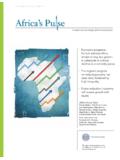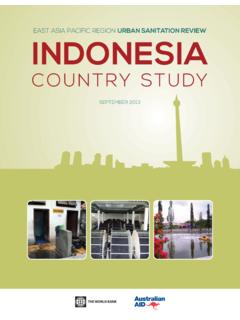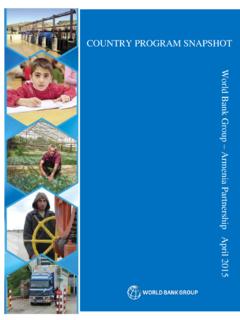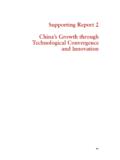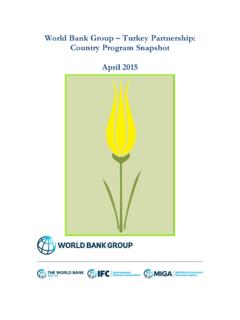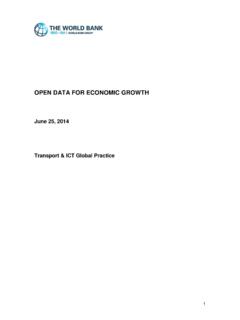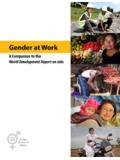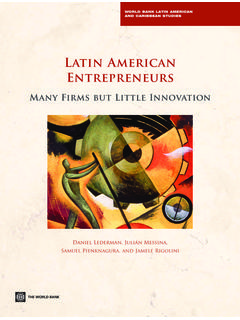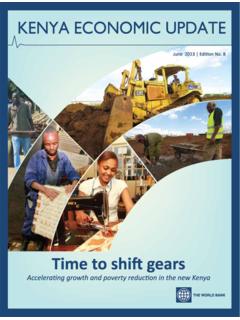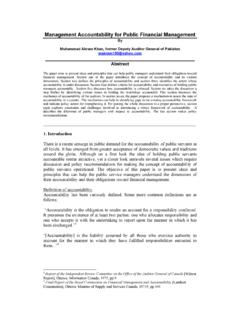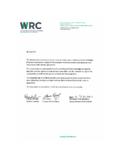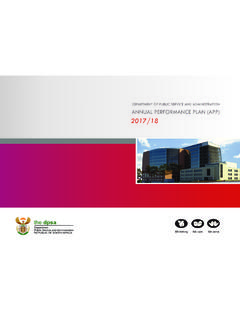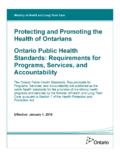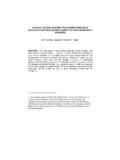Transcription of Why Reform Public Procurement? - World Bank
1 Why Reform Public Procurement? Why Reform Public Procurement? AcknowledgmentsThe Middle East and North Africa (MENA) regional procurement conference, organized by the World bank MENA procurement Team and the World bank Institute, was held in June 2012 in Amman, Jordan, and served as the basis for this Guide. The conference was made possible by the generous financial support from the Ministry of Economy and Competitiveness in Spain. This Guide was prepared by a team led by Yolanda Tayler ( World bank ) and comprising Simeon Sahaydachny ( Public procurement legal consultant), Guenter Heidenhof ( World bank ), Jeff Thindwa ( World bank Institute), Marcela Rozo ( World bank Institute), Carolina Luisa Vaira ( World bank Institute), Sameh Mobarek ( World bank ), Nazaneen Ali ( World bank ), Andrew Jacobs ( World bank ), Laurence Folliot Lalliot ( Public procurement legal consultant), George Jadoun (ITC-ILO), Siham Nuseibeh (consultant), Lina Hilwani (consultant), and the Institut des Finances Basil Fuleihan in Lebanon.
2 Bruce Ross- Larson assisted the team as the principal editor. The work was carried out under the general direction of Hedi Larbi and Laura Tuck ( World bank ), with special thanks to Inger Andersen ( World bank ) for her paper has not undergone the review accorded to official World bank publications. The findings, interpretations, and conclusions expressed herein are those of the author(s) and do not necessarily reflect the views of the International bank for Reconstruction and Development/The World bank and its affiliated organizations, or those of the Executive Directors of The World bank or the governments they represent. The World bank does not guarantee the accuracy of the data included in this permission to photocopy or reprint any part of this work, please send a request with complete information to the Copyright Clearance Center, Inc.
3 , 222 Rosewood Drive, Danvers, MA 01923, USA, telephone 978-750-8400, fax 978-750-4470, other queries on rights and licenses, including subsidiary rights, should be addressed to the Office of the Publisher, The World bank , 1818 H Street NW, Washington, DC 20433, USA, fax 202-522-2422, email: 2012 by the International bank for Reconstruction and Development/THE World BANK1818 H Street NWWashington DC and layout by Communications Development Incorporated, Washington, Reform Public procurement ? 3 ContentsPreface 5 What reforming Public procurement can mean for development 6 Public procurement for governance and social accountability 7 Public procurement for service delivery 10 Public procurement for private sector development and trade 12 Capacity development for Public procurement 14 Boxes1 Governance and Public procurement reforms in Morocco 72 Check My School initiative in the Philippines 93 Introducing e- procurement in Chile 114 Public procurement and international treaties in Jordan 135 Public procurement and capacity development in Lebanon 14 Figure1 Steps for developing national Public procurement training programs 15 WHY Reform Public procurement ?
4 5 PrefaceThis report provides a concise practical overview on key issues encountered in reforming Public procurement systems and the wider development purpose such reforms serve. It is an outgrowth of the World bank conference in Amman, Jordan, on June 5 7, 2012, Towards Better Governance and Public Sector Performance in MENA: Harnessing Regional Public procurement Reform Efforts. The conference highlighted the various efforts of governments in the Middle East and North Africa (MENA) region to Reform Public conference examined procurement Reform issues from four key development perspectives: governance and social accountability , service delivery, private sector development and trade, and capacity development. Those perspectives are particularly pertinent to citizen demands across the MENA region. People want more equal economic opportunity and development, more say in government decisions, a more responsive and effective Public sector, and an end to corruption.
5 That is one of the main reasons why regional governments should enhance transparency, participation, and social accountability in Public sector management. Reforming and modernizing Public procurement is a major arena for such aspirations. 6 WHY Reform Public Procurement? What reforming Public procurement can mean for developmentThe Middle East and North Africa (MENA) region faces unprecedented governance challenges, with citizens demanding transparency, accountability , and a greater say in their governments. It also needs to improve the efficiency of managing Public finances. The challenges can be viewed as opportunities for real change and fundamental improvements, and Public procurement Reform lies at the heart of this opportunity. It can be a catalyst for improving Public policy and engaging civil society and other stakeholders.
6 In this context, Public procurement Reform becomes an important tool for strengthening and supporting governance reforms and better Public sector performance across the region. It is one of a government s most effective tools for sustainable Public sector Reform . It is at the core of translating Public policy into tangible results for citizens, delivering essential services, and implementing projects and programs. Further, Public procurement Reform can contribute directly to improving a country s business, investment, and social environments. The report looks at Public procurement and its contributions to: Governance and social accountability . Service delivery. Private sector development and trade. Capacity each, the report spells out the interactions with Public procurement , the challenges, and the core actions and Reform Public procurement ?
7 7 Public procurement for governance and social accountabilityAt the heart of good governance lies effective Public financial management, which is linked to multistakeholder engagement, political accountability , effective checks and balances, and decentralization and local participation. Three pillars of effective and successful governance are increasing value for money, improving Public service delivery, and creating an enabling environment for private sector led growth. Public procurement , with links to all three pillars, is thus an essential element of governance reforms. Making up between 15% and 20% of GDP, it contributes to greater competitiveness by stimulating trade and fostering foreign direct investment. While good Public procurement is a prerequisite for economic growth and effective Public investment, poor governance of Public procurement systems can turn Public investments into major political and economic liabilities, hinder development goals and outcomes, and result in additional costs and waste Public funds.
8 procurement systems can thus be viewed as promoting good governance and instilling reforms in governance systems. A good procurement system that features transparency, accountability , and stakeholder participation can be a practical tool for carrying out effective governance reforms (box 1). Social accountability is an approach to governance that promotes inclusive and accountable government through civil society organizations (CSOs) and citizen participation. Through it, government institutions and services account publicly for their performance, enabling weaknesses in governance, including corruption, to be exposed and remedied. If it is inclusive and participatory, social accountability in MENA can build trust between government actors and procurement is an essential governance arena, and the way it is executed reflects the level of social accountability .
9 Likewise, approaches to governance that incorporate citizen participation can engender more relevant, responsive, and effective government policies, budgets, and services. With the goal of modernizing procedures and increasing transparency, the government of Morocco recently produced a new draft Decree on Public procurement . Some of the challenges involved unifying, simplifying, and clarifying Public procurement procedures across Public institutions, local communities, and architectural services. Others involved promoting fair competition, enhancing transparency and ethical management, upgrading systems through a web portal, developing a disputes settlement mechanism, considering environmental performance and protection, supporting small and medium enterprises, and encouraging local big steps have been taken to Reform the governance and legal framework for Public procurement , implementing Reform will require building the capacity of all stakeholders, developing information technology, communicating and exchanging experiences with international partners, and including civil society and the private sector as partners in Reform .
10 Box 1 Governance and Public procurement reforms in morocco8 WHY Reform Public Procurement? The International Budget Partnership estimates that developing countries spend $820 billion a year on procurement -related transactions. But procurement is one of the government functions most prone to corruption. According to Transparency International, up to a fifth of the value of government contracts may be lost to corruption. Active citizen engagement in monitoring procurement and advocating for better performance can aid in preventing and detecting corruption in Public procurement , improving the delivery of Public services, increasing the efficiency of Public financial management, and enhancing government accountability . Citizens can engage in Public procurement at different stages. Civil society can become a key contributor to the policy debate and Reform process in all areas of government responsibility, including Public procurement .

